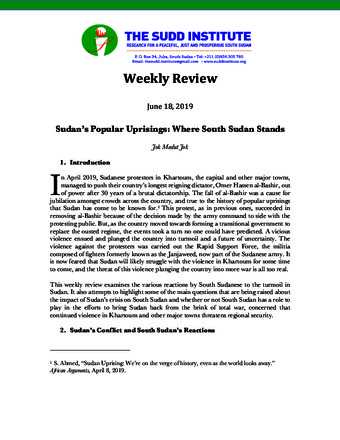Sudan’s Popular Uprisings: Where South Sudan Stands
Publication Summary
In April 2019, Sudanese protestors in Khartoum, the capital and other major towns, managed to push their country’s longest reigning dictator, Omer Hassen al-Bashir, out of power after 30 years of a brutal dictatorship. The fall of al-Bashir was a cause for jubilation amongst crowds across the country, and true to the history of popular uprisings that Sudan has come to be known for. This protest, as in previous ones, succeeded in removing al-Bashir because of the decision made by the army command to side with the protesting public. But, as the country moved towards forming a transitional government to replace the ousted regime, the events took a turn no one could have predicted. Vicious violence ensued and plunged the country into turmoil and a future of uncertainty. The violence against the protesters was carried out by the Rapid Support Force, the militia composed of fighters formerly known as the Janjaweed, now part of the Sudanese army. It is now feared that Sudan will likely struggle with the violence in Khartoum for some time to come, and the threat of this violence plunging the country into more war is all too real.
This weekly review examines the various reactions by South Sudanese to the turmoil in Sudan. It also attempts to highlight some of the main questions that are being raised about the impact of Sudan’s crisis on South Sudan and whether or not South Sudan has a role to play in the efforts to bring Sudan back from the brink of total war, concerned that continued violence in Khartoum and other major towns threatens regional security.
Jok Madut Jok is trained in the anthropology of health and holds a Ph.D. from the University of California, Los Angeles (UCLA). He is a fellow of Rift Valley Institute and Director of the Sudd Institute. Jok has held fellowship positions at a number of other institutions, including the United States Institute of Peace and the Woodrow Wilson International Center for Scholars. He also served in the Government of South Sudan as undersecretary in the Ministry of Culture and Heritage for three years. He has also worked in aid and development and author of four books and numerous articles covering gender, sexuality and reproductive health, humanitarian aid, ethnography of political violence, gender-based violence, war and slavery, and the politics of identity in South Sudan and Sudan. His book Breaking Sudan: The Search for Peace, was published in 2017 by OneWorld.

